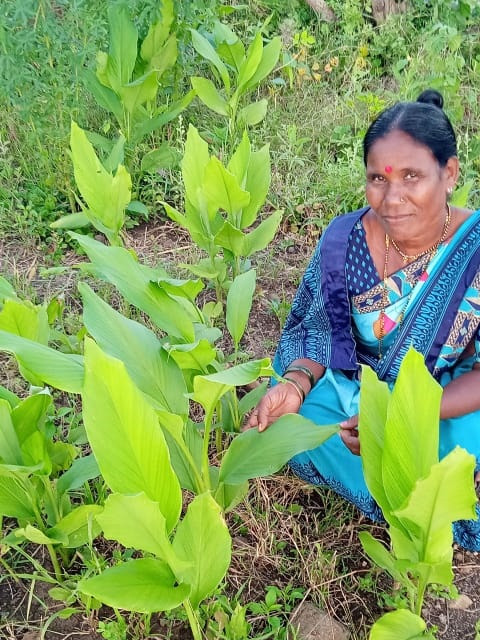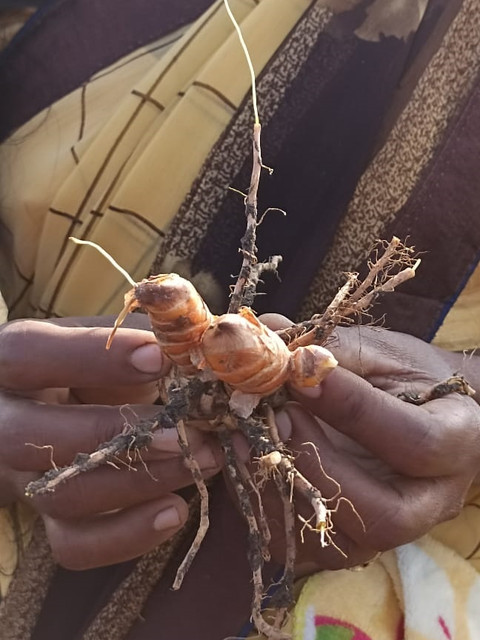Challenging traditions, changing practices: A story of a woman farmer from Ralegaon
- Hippu Salk Kristle Nathan
- Aug 7, 2022
- 4 min read
Updated: Feb 14, 2023
How one farmer’s inquisitiveness and courage transformed a social taboo around turmeric cultivation, instead becoming an additional source of income for the community.
In recent times, the issue of menstruating women’s entry to the Sabarimala Temple in Kerala has made national headlines. Such menstruation related gender discrimination is not limited to temple entry and is pervasive in other sectors as well. One such example is agriculture. I had the opportunity to meet Smt. Madhuri Khadse, the Secretary of the Prerna Gram Vikash Sanstha (henceforth, Prerna) at Raveri village of Ralegaon Taluka of Yavatmal District of Maharashtra state. Established in 1996, Prerna works in the domain of women empowerment, by enabling women as leaders, entrepreneurs, and change makers through social enterprises and initiatives that offer a range of skill-building, agricultural, bio-energy, and health-enhancing opportunities. The organisation is working in more than 150 villages belonging to some of the backward talukas of Yavatmal, Wardha, and Gadchiroli districts of the state.
What counts as sacred and sacrilege – Tradition of turmeric cultivation
Smt. Madhuri recently came to know about the tradition of restricting women of menstruating age group from touching and cultivating turmeric (haldi) plants. In 2020-21, to promote organic agriculture, Prerna took an initiative among women farmers to cultivate green gram (moong), roselle plant (ambadi), haldi, etc. on experimental basis for self-consumption. When Smt. Madhuri interacted with the village women (who were already connected with Prerna in various programmes) motivating them to join this initiative, she got the response that being in menstruating age group they should not cultivate sacred crops like haldi. When asked about this, Smt. Madhuri said,
“This response I got in every village meeting. I was surprised as I have been working with the women farmers in several development programmes in these villages for last 25 years. But I never knew about this tradition.”
Being the inhabitant of same locality, Smt. Madhuri was aware of many other taboos associated with menstruation in that region. Girls and women while having period (for those four to five days) are not allowed to visit temples and socio-religious functions; in some cases, they do not cook, and are asked to take bath outside of home premises. They are not allowed to touch several things. But forbidding menstruating women to touch or nurture haldi plants, and in some cases chili (mirchi) plants took her by surprise.
On her take on these traditions, she said candidly,
“I always found these conventions odd and unjust. Personally, I have never been a victim of these traditions. Both my parents’ and in-laws’ families are liberal enough to not to put any such restrictions on me. So, when I came across this particular restriction in agriculture, I thought that I should test this tradition.”
Smt. Madhuri motivated 60 women of the area to experiment with haldi planation. She herself also did the same at homestead firm as well as office premise.

Harvesting hope through Haldi
The women had a lot of apprehensions. They were unsure whether the seeds would germinate; or whether the plants would sustain. But in reality, germination happened normally; no haldi plants got burnt, spoilt, or suffered from non-formation of haldi as conventionally believed. To motivate each other, the women shared pictures of their haldi plants in their social media groups.
Pic 1. A farmer touching the leaves of haldi plant that she has grown
Pic 2. A farmer touching the roots of haldi plant she harvested
Smt. Madhuri played a key role in this whole process. In her own words,
“I would motivate the women coming to my office by showing them healthy flowering haldi plants in office premise. I would demonstrate to them that nothing happens to the plant, when I myself, being in the menstruating age group, touch or water the plant.”
Challenging regressive practices to engage with larger gender issues
Smt. Madhuri always had a penchant for social causes and development issues. After her graduation in Political Science in Marathi medium in 1995 she worked in an NGO named Gramin Samasya Mukti Trust. After her marriage in 1998 she worked in Prerna where her husband was associated. She has keen interest in reading and learning about new ideas. At the NGO, she has made use of training opportunities (both as a trainer and trainee) for such learning. She had taken up this issue out of her inquisitiveness to figure out whether these traditions are worth pursuing or just superstitions to be dismissed.
The issue of restricting menstruating women from cultivation has to be seen from the larger context of changing role of women in agriculture. With increasing men migration from rural areas in search of better livelihood options, women tend to take full responsibilities of agriculture. However, the additional responsibilities are not matched with equal rights; be it about land ownership, market access, agriculture wage labour, or even representation of women in different farmer organizations. As per the Periodic Labour Force Survey 2017-18, women own only 12.8% of land holdings. The 2011 State of Food and Agriculture report of FAO showed that there is 20-30% yield gap between male- and female-cultivated land due to women’s lack of access to resources.
Pic 3. Flower of the haldi plant
Pic 4. One of farmers proudly showing the fully developed haldi
In the backdrop of such challenges, Smt. Madhuri’s initiative of motivating women for haldi plantation has not only imparted confidence to the women to question age-old traditions and religious patriarchy, but also reaffirmed the significant role they can have in reimagining agriculture.
“This year we will sow more seeds of haldi. Last year I only used half-a-acre land for it. This year, I will do it for acre or more. In fact, last year we were doubtful. This year more women have come forward to cultivate haldi. We want to show that we can cultivate the best of the crops in menstruating age. This will help all of us to come out of this superstition and as well as diversify our income.”,
explains Smt. Madhuri with a determined smile.
One can hope that such changes create a ripple effect for freeing minds from age-old superstitions while enabling larger, equitable transformations in the sphere of gender and agriculture.
Hippu Kristle Salk Nathan is an associate professor at IRMA.

_edited.jpg)








Comments